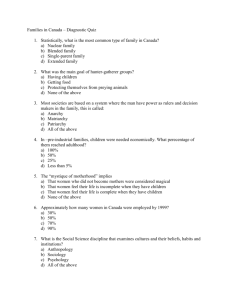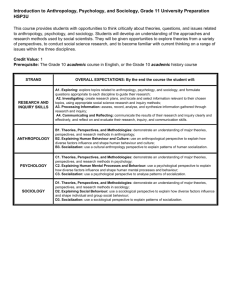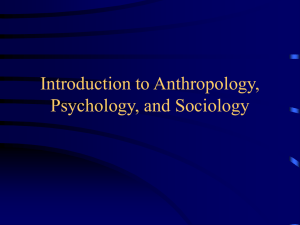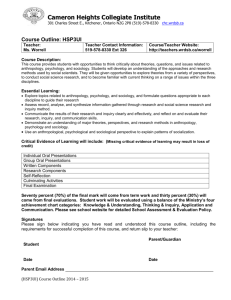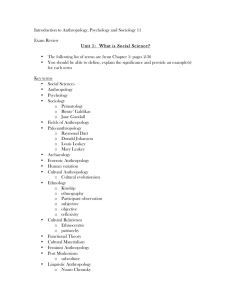File - Patricia McNeil
advertisement
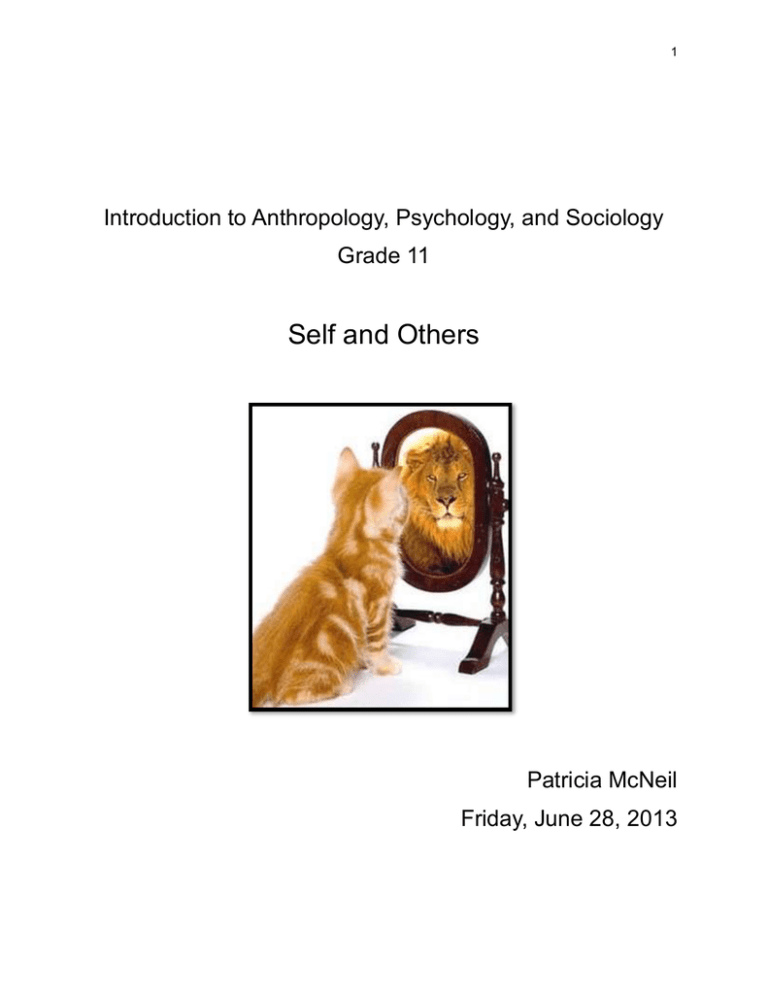
1 Introduction to Anthropology, Psychology, and Sociology Grade 11 Self and Others Patricia McNeil Friday, June 28, 2013 2 Introduction to Anthropology, Psychology, and Sociology: Self and Others Author: Patricia McNeil Length of Unit: 7 lessons Grade: 11 Rationale – Why Am I Teaching This Unit? - The following unit is appropriate at this time because students are beginning to think about where their interests lie with respect to their future endeavours outside of secondary school. There is no prerequisite for this course, so many of the students will learn about many concepts and theories in this course for the first time. - Due to the fact that many of the students may not be familiar with the course content, writing reflections will help to solidify that knowledge and will allow them to explain it in their own words. - This unit is based upon the three overall expectations and several of the corresponding specific expectations stated within the Ministry of Education curriculum. - This unit will assist in developing their skills to think critically and reflect on the new information learned. It will also involve research and inquiry into many issues that are relevant in today’s society. Learners’ needs will be addressed in several ways Intellectually – students will be introduced to new information and will engage in thoughtprovoking discussion Socially – students will do many activities in groups or pairs, working as a team Physically – the activities will involve some movement around the classroom, allowing students to stretch and walk around (they won’t be sitting in every single lesson) Emotionally – the students will write in their journals at certain times, which will allow them to reflect on how they felt about a certain activity, or information within a lesson, as well as on their learning that day. - The abilities and diversities are reflected in this unit in the group work. Students will have the opportunity to choose their groups, but at times I will be the one assigning the groups, to ensure that each group reflects diversity and includes a variety of abilities. 3 Overall Expectations describe some differences and similarities in the approaches taken by anthropology, psychology, and sociology to the concept of self in relation to others demonstrate an understanding of the social forces that influence and shape behaviour as described by anthropologists, psychologists, and sociologists analyse socialization patterns from the perspectives of anthropology, psychology, and sociology Specific Expectations Identify and assess the major influences that contribute to an individual’s personal and social development (e.g., heredity, environment, race, gender) Analyse the role of the mass media in influencing individual and group behaviour. Evaluate the role of cultural influences in socialization (e.g., as they affect gender expectations). Identify and assess the major influences that contribute to an individual’s personal and social development (e.g., heredity, environment, race, gender); Explain why behaviour varies depending on context and on the individuals involved (e.g., at work, within a family, in sports, in a crowd, in a large city or small town). Demonstrate an understanding of anthropological, psychological, and sociological theories that deal with socialization (e.g., enculturation, nature versus nurture, social isolation) Pre-Assessment/Prior Knowledge Learners The learners in this unit will be coming from a variety of different experiences and backgrounds, as some students may be from cultures or religious backgrounds which view the concepts and theories differently than Western culture. The learners may also have never thought critically about the concepts within this unit, and therefore taking a step by step approach to this unit is necessary for all levels of understanding. Learning Environment For this unit, learning would best occur in the classroom. The desks will be arranged in pairs to allow for creative partner and group activities to occur, with space between each grouped set, so that I will have room to move between and around the desks to assess students’ work. For class discussions, students will be asked to move their desks into a horseshoe shape or circle. During class activities, either group or individual, students will sit at their desks. Demonstration Statements/Culminating Activity To demonstrate learning throughout this unit, students will: Answer class questions and participate in discussion periods Write reflection journals to log their progress and to demonstrate what they have learned 4 Teacher Planning Sheet (Formal lesson plans are in bold) Lesson Introduction to Theories Regarding the Self in Relation to Others Nature vs. Nurture Motivation Social Groups Specific Expectation Evaluate the major contributions to our understanding of the idea of self in relation to others made by at least one of the leading practitioners in each of anthropology, psychology, and sociology. Identify and assess the major influences that contribute to an individual’s personal and social development Identify and assess the major influences that contribute to an individual’s personal and social development. Identify and assess the major influences that contribute to an individual’s personal and social development Explain why behaviour varies depending on context and on the individuals involved. Demonstrate an understanding of anthropological, psychological, and sociological theories that deal with socialization Teaching/Learning Strategies Resources Assessment Evaluation In this lesson, students will learn about the theories regarding the self through note-taking, class discussion, and group work to further investigate these theories. Textbook “Images of the world: introduction to Anthropology, Psychology and Sociology” McGraw-Hill - Observation Anecdotal notes Class discussion Refection journal This lesson will use class discussions, research exploration, and reflection questions to explore the debate of genetics vs. environment. The students will work in small groups to discuss and examine theories on motivation and how motivation may affect behaviour. http://www.mcgrawhill.ca/school/ products/9780071058186/ - Observation Anecdotal notes Class discussion Reflection journal Images of the world: introduction to Anthropology, Psychology and Sociology - Observation Anecdotal notes Class discussion In this lesson, students will reinforce previous knowledge of factors that influence behaviour through a class debate on nature vs. nurture. Sociobiology and You: http://www.thenation.com/article/ sociobiology-andyou#axzz2XS5at4Kr - Observation Checklist (debate) Self-assessment Class discussion http://www.sciencenewsforkids.o rg/2008/12/double-take-2/ Textbook “Images of the world: introduction to Anthropology, Psychology and Sociology” McGraw-Hill 5 Agents of Socialization Gender Roles And The Mass Media Analyse the role of the mass media in influencing individual and group behaviour Explain the role of socialization in the development of the individual Identify the primary and secondary agents of socialization and evaluate their influence Analyse the role of the mass media in influencing individual and group behaviour Evaluate the role of cultural influences in socialization How the Media Influences Behaviour Evaluate the role of cultural influences in socialization (e.g., as they affect gender expectations). Explain the role of socialization in the development of the individual. Culminating Task Analyze the role of the mass media in influencing individual and group behaviour Identify and assess the major influences that contribute to an individual’s personal and social development Effectively communicate the results of their inquiries, using a variety of methods and forms This lesson will teach students about the various agents of socialization and how those agents can determine behaviour. Students will engage in role-play to demonstrate their understanding. In this lesson, there will be class discussions/debates, reflection questions, and oral presentations to explore, think about, and present ideas on gender roles in the media. In this lesson, students participate in a questionnaire to reflect on their own body image, then as a group analyze and interpret images within magazine ads, finally presenting their selections to one another. In this culminating task, students take what they have learned throughout the unit and apply it to creating an advertisement as a group. Each group with present their ad to the class. Images of the world: introduction to Anthropology, Psychology and Sociology http://en.wikipedia.org/wiki/Socia lization#Socialization http://www.youtube.com/watch? v=S5pM1fW6hNs http://www.youtube.com/watch? v=3exzMPT4nGI http://www.youtube.com/watch? v=uOIIUQehzDI http://www.mcgrawhill.ca/school/ products/9780071058186/ Body Image Questionnaire was found as a word doc through Google, and I have made a few modifications to it in order to ensure it is appropriate for this lesson. Images of the world: introduction to Anthropology, Psychology and Sociology - Observation Anecdotal notes Role-playing Class discussion - Observation Anecdotal notes Class discussion Oral presentation Reflection journal - Observation Anecdotal notes Class discussion Oral presentation Reflection journal - Observation Presentation Rubric Peer-assessment 6 Accommodations I will frequently repeat questions asked in class, to ensure that all students are able to hear it and keep up with the discussion that is happening, particularly if they have low vision. I will ensure that all discussion questions and activity instructions are posted visually so that students who are hard of hearing, or who do not happen to hear instructions in that moment, are able to read the instructions/questions themselves. I will arrange the classroom so that students who are heard of hearing and have low vision are seated closer to the front. When I show audio-visuals, I will pause often to discuss/explain what is happening, and will ensure students who have low vision or are heard of hearing are sitting closer to the screen so they can see/hear. I will hand out study sheets with a summary of the information learned at the end of each class, so that students are all able to review what they learned. I will offer alternatives to formal testing for assessment, opting for anecdotal notes, reflections, class discussions, and fun activities. I will offer opportunities for one-on-one time with all students, particularly those with exceptionalities, as they may have additional questions or require additional support. Diversity Issues I will encourage both males and females equally to participate in my lesson activities, and will hopefully be a role model to the female students in the class for my love of science. The environment will be set up as a safe space where students who come from cultures which may disagree with my lessons can express their views freely and without reprimand. The class discussions will be set up in a way to simply encourage students to think critically about their bodies. I will ensure there are a variety of different things for students to do, to accommodate for learning styles, including (but not limited to) activities, discussion, and independent reflection. Evaluation will be primarily based on my own anecdotal notes and the students’ reflections. This way assessment is based on the student as an individual, without comparing them to their classmates.
